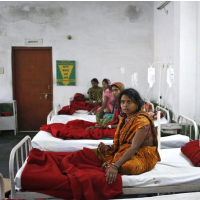14 Deaths Later, Blame Game in Chhattisgarh, But Sterilization Camps Continue
 Women who survived last week's sterilization surgery, recovering in Bilaspur (photo: Reuters)
Women who survived last week's sterilization surgery, recovering in Bilaspur (photo: Reuters)
Tainted or sub-standard drugs are being blamed for the deaths of 13 women after sterilisation surgery at a family-planning ‘camp’ in Chhattisgarh last weekend, with owners of the factories that produced them being summoned for questioning. But that has not stopped the state government from holding another such ‘camp’ this week, where another woman died after her operation on Monday – the 14th death so far.
Meanwhile, the doctor who carried out the sterilisation of 83 women in under three hours last Saturday denied reports the equipment he used was rusty or dirty, and blamed adulterated medicines for the tragedy.
"I am not the culprit. I have been made a scapegoat. It is the administration which is responsible for this incident," Dr. R.K. Gupta told Reuters after being taken into police custody on Wednesday night.
Gupta claimed that health workers gave the women Indian-made brands of ciprofloxacin, a commonly prescribed antibiotic, and the painkiller ibuprofen after operations conducted at the weekend in a grimy room of an unused private hospital in Pandari village. Thirteen have died so far and scores are in hospital.
The state administration of Chhattisgarh has now banned the medicines used by Gupta, but these are still reportedly available in rural areas.
"Owners of the companies responsible for the sale of drugs have been summoned," Chief Minister Raman Singh told reporters. "They will all be questioned and we have sealed their factories."
State health officials said that when police raided on Wednesday a local company, Mahawar Pharma, which had provided the antibiotics, the doors were locked from the inside. A few hours later, after the police left, witnesses reported smoke started rising from medicines burning behind the building.
Speaking in police custody, Ramesh Mahawar, the managing director of Mahawar Pharmaceuticals, told Reuters he and his son were innocent. He said the deaths and illness had only happened in Bilaspur, while his medicines have been sold elsewhere.
"The situation has been twisted in a wrong manner. We are just being harassed," said Mahawar, who has been making drugs for 35 years.
The tragedy has put the spotlight on India’s practice of sterilizing people voluntarily to reign in population growth. With more than four million Indians sterilized every year, a system of quotas encourages officials and doctors to cut corners, activists say.
Rights groups say India's sterilization programme is coercive because ill-educated women are often offered money to accept surgery without knowing the full risks.
According to Reuters, women who survived last weekend’s operation said they had been promised 600 rupees ($10), but several said they received less or nothing at all.
Mangli Bai, recovering on a drip at a nearby hospital, said she was given 230 rupees. "The health worker duped us, saying the rest was for photocopying and conveyance."
Meanwhile, Gupta, who says he has conducted more than 50,000 female sterilizations and was awarded a state honour 10 years ago for his sterilization work, faces charges of causing death by negligence.
According to guidelines, doctors should spend at least 15 minutes on each operation and perform a maximum of 10 in a day. Several doctors told Reuters it was common to perform up to 90 sterilisations a day, leaving little time to maintain hygiene.
"If they kept in that place 83 women, it is my moral responsibility to operate on all the women," Gupta said. He said he generally took between two and five minutes on each operation, but gave his assistants time to clean scalpels.
"They are dipped in spirit after an operation and then re-used. If I feel it is not working, well, I change it. I do about 10 operations with the same knife."
Gupta claimed it was the responsibility of the government to clean the operating room, which police say was filthy, hung with cobwebs and littered with bloodied sheets after last weekend’s operations.
To Learn More:
Police search Chhattisgarh drug factory linked to sterilisation deaths (by Aditi Shah and Aditya Kalra, Reuters)
Chhattisgarh sterilisation tragedy: 14 deaths later, the buck passing begins, probe on (by Ashutosh Bhardwaj, The Indian Express)
Chhattisgarh sterilisation tragedy: Despite deaths, 26 more tubectomies were done in one hour in another camp (by Ashutosh Bhardwaj, The Indian Express)
- Top Stories
- Controversies
- Where is the Money Going?
- India and the World
- Appointments and Resignations
- Unusual News
- Latest News
- India College Chain’s Expansion into U.S. Draws Opposition from Massachusetts Officials over Quality of Education
- Milk Shortages in India Tied to Release of New Movies Featuring Nation’s Favorite Stars
- Confusion Swirls around Kashmir Newspaper Ban in Wake of Violent Street Protests
- Polio-Free for 5 Years, India Launches Vaccine Drive after Polio Strain Discovery
- New Aviation Policy Could Increase Service, Lower Ticket Prices






Comments